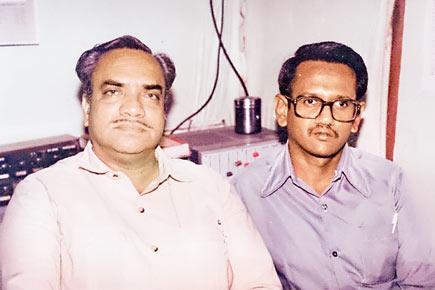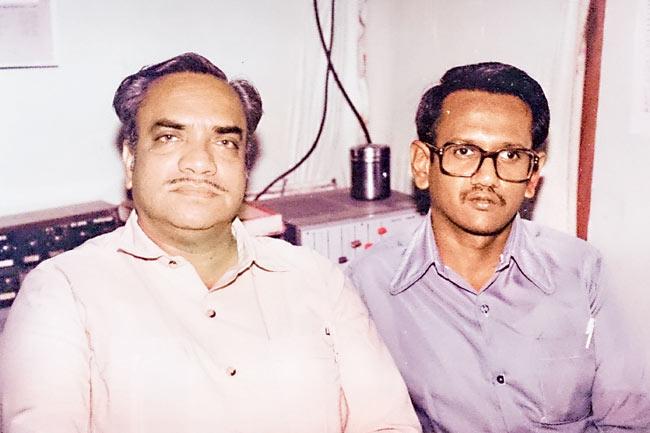Almost 50 years ago, local trains saw another landmark — the railway announcer. Saurabh Datar went looking for the story of late JSB Brownson, one of Mumbai’s first announcers, who developed the public address system into what it is today

It’s hard, nigh impossible, to imagine a Mumbai railway station without the announcer. How would you know which platform to run to? What is the order of the coaches in your train? Yet, the suburban railway system once functioned without these guiding voices, until one man decided to provide this service to passengers. That man was JSB Brownson.

JSB Brownson (left) with Prakash Kurbet, the current Dadar announcer, who attended the AIR training sessions, and learnt the nuances of the trade from him
ADVERTISEMENT
Ticket checks to mike check
Joseph Sudhir Barnabas Brownson joined Central Railway (CR) on May 4, 1957, as a ticket checker (TC) at Ulhasnagar. “In those days, there were no announcers. TCs used to call out train timings,” says Venkatesh Desai, a retired chief railway controller who worked with Brownson at Central Railway. Desai’s book in Marathi, Rail Chakra, a treasure trove of anecdotes and incidents, mentions the man.
Journalist Rajendra Aklekar, who runs the Bombay Railway History Group, which documents the history of railways in the city, explains, “Railways in (then) Bombay were electronised in phases. First was CR — then called Great Indian Peninsula Railway — 1925, followed by Western Railway (then Bombay, Baroda and Central India Railway) in 1928.
Post electronisation, station masters or TCs made announcements over microphones. Brownson was one of the early announcers.”
After working at Kalyan and Kurla, Brownson moved to Dadar on June 11, 1963. The TCs then had many jobs — checking tickets, changing indicators (they were manually operated then) and announcing train arrivals and departures. Speaking on the mike was not their forte. Nobody could decipher what they said; people called them ‘bomblya’ (Marathi for ‘one who blabbers’).
Brownson, however, was clear and precise. He delivered information in an easy, understandable manner. “People started coming to Dadar just to listen to his announcements,” says Desai. He speaks admiringly of Brownson, who, he says, developed his own style and diction for announcements.

An old newspaper report about Brownson’s part-time scheme, which paved the way for women announcers
The Dadar announcer
Eventually, Brownson was given a cabin and became the first full-time announcer of Mumbai division. So mesmerising was his voice that Marathi theatre stalwarts — Satish Dubhashi, Datta Bhat, Bal Kolhatkar, Mohan Wagh, etc — not only appreciated his work but also they invited him to their plays. Melville De Mellow, the All India Radio legend known for his broadcast commentary of Mahatma Gandhi’s funeral, commended him.
“People called him Dadar announcer even after he retired,” says his son Moses, who is also with the Railways. He recalls his father’s efforts during summer holidays; there was no computerised reservation then. “People would put up pandals outside railway counters to book tickets. This was called ‘summer rush’. My father would be in office for days, making announcements on where to line up for tickets, and controlling the chaotic crowds,” adds Moses. This dedication earned him 21 awards, a list of which Moses shows us with great pride. “There was a small TV set outside the announcer’s office, in which people could see my father making announcements. That’s how most people knew him,” he recalls.
Mentoring others
After 16 years at Dadar, Brownson moved to Victoria Terminus (now CST) in 1979 as chief announcer of the Central Announcement System (CAS), which was also introduced then. Any announcement made through this system could be heard at all stations from Masjid to Kurla then (Today, the CAS goes all the way up to Karjat, Kasara and Panvel on the three arms of the massive Mumbai division of Central Railway).
After his move to the CAS, encouraged by the then divisional railway manager, K Ramakrishnan, Brownson wrote the first-ever handbook for announcers. The booklet is the Bible for rookies, with guidelines, announcement formats in all three languages (Brownson was fluent in Marathi, Hindi and English), and tips (see box).
Milind Hiwale, the current chief announcer at CST, credits Brownson for formalising the system and for virtually establishing the system from scratch. Brownson brought in new announcers and mentored them personally, teaching them the tricks of the trade. ‘Brownie’, as friends and colleagues called him, maintained a dedicated, high-quality team.
On his suggestion, they were sent to All India Radio, Delhi for voice training classes. Prakash Kurbet, the current announcer at Dadar, was one of them. “Brownson taught me how to speak on the mike. He even gave me vocal chord and mouth exercises to make sure I had clarity in my voice,” he remembers.
Spearheading change
Around 1982 or so, Brownson introduced a scheme for college-going children of railway employees, to work as part-time announcers. This resulted in the first batch of women announcers joining CR, many of whom became full-time employees.
Almost a decade later, the announcement system was automated — people wouldn’t have to call out train timings every few minutes. A pre-recorded message would be played, as per the train schedule. Manual announcements would be made only in case of emergencies or special situations (like it is today).
“In 1992-93, the system was being automated. Brownsonsaheb supervised all recording sessions at the studio. All current train announcements are based on his guidelines,” says Hiwale, who now heads 170 announcers in CR’s Mumbai division.
Brownson retired in May, 1994, and passed away on October 17, 2007. For a man who spoke for 38 years, and whose work is now synonymous with Mumbai, Brownson’s name is rarely uttered. Here’s wishing more people speak about this unsung hero.
 Subscribe today by clicking the link and stay updated with the latest news!" Click here!
Subscribe today by clicking the link and stay updated with the latest news!" Click here!







